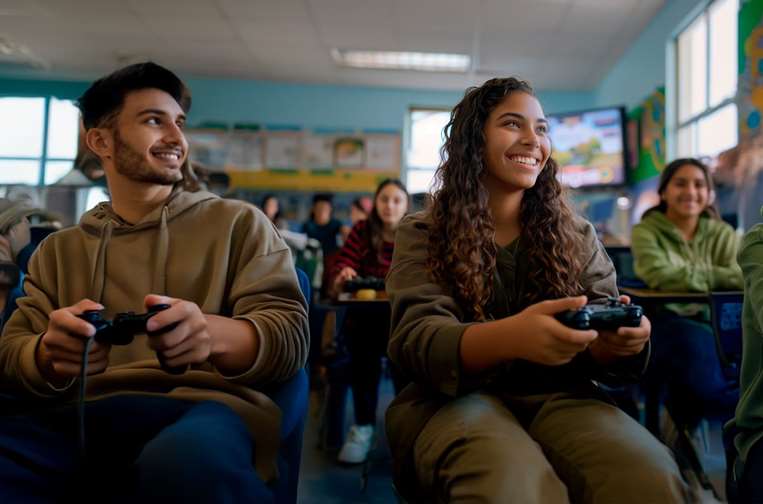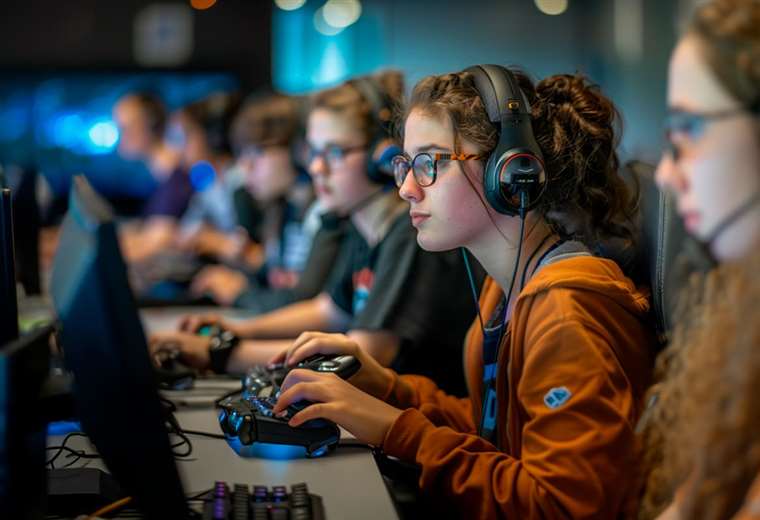September 3, 2024, 8:57 AM
September 3, 2024, 8:57 AM
With more than 3.2 billion gamersAmong professionals and amateurs, all over the world, video games have won the preference of children, adolescents and young people and are projected as educational tools, with great potential to improve the teaching-learning process, in the short and medium term.
“Video games have significant potential in education if they are managed in a purposeful way,” says Pablo Llano, an expert from the Teaching and Learning Department (JEA) of Franz Tamayo University (Unifranz).
Llano acknowledges, however, that effective integration of video games into the classroom requires careful planning. “Teachers and professors must select appropriate games, align them with learning objectives, and provide appropriate guidance to students.
According to EducaOpen, a technological-training platform, educational video games are a very powerful tool to teach students about various subjects in an interactive way and without boring them.
“Unlike regular video games, these educational games are specifically designed to teach academic concepts to students while having fun, with the goal of helping students internalize knowledge more easily and develop essential skills for their education.
For example, Minecraft is an excellent example of how a video game can go from a popular pastime to a cutting-edge educational tool due to its collaborative spirit, which encourages problem-solving and creativity.
Video games are digital experiences that allow you to tell a story and be part of it, as the protagonist. For Álvaro Gutiérrez, a professor of Psychology at Unifranz, teachers and parents can incorporate the use of video games to complement the education of their students and children.
“As adults, we can no longer afford to ignore what our children or students are playing. It is important, first, to learn about the classifications that these games have, since, like movies, they have an age rating (people on screen) and the different genres of these, in order to use them in learning,” explains the academic.
The role of video games in education has been more explored at basic levels, but in terms of higher education there is little empirical evidence to support their effectiveness as an educational tool, explains Sofía García-Bullé, from the Institute for the Future of Education at Tecnológico de Monterrey.
“There are indications to think that video games can be a good resource for educational innovation at universities, even if we lack studies that confirm their effectiveness 100%, it remains an interesting and useful proposal to explore,” says the expert in her article “Video games: A potential educational tool.”
Benefits of video games in education
Beyond just a hobby, video games have a positive impact on children’s educational process, as they allow them to become literate and acquire digital skills almost without realizing it.
EducaOpen identifies other additional benefits:
1 Development of cognitive skills
Video games are a great challenge in which students must resort to critical thinking and some strategic planning to advance through the plot or levels. This constant mental stimulation strengthens students’ problem-solving skills and teaches them to analyze situations from different perspectives.
2 Development of motor skills
Video games also promote the development of motor skills, especially the brain-hand connection, which is essential for everyday activities such as writing, drawing, and other manual tasks.
3 Improved concentration
This skill is transferable to educational settings, where students can apply the same ability to concentrate to tasks such as solving math problems or reading complex texts.
4 Train problem solving and creativity
Many games present complex scenarios that require innovative and creative actions. By overcoming small challenges, students learn to think flexibly and seek out-of-the-box solutions.
5 It is a source of motivation
Video games are a source of playful learning that is automatically associated with concentration.

Llano points out that educational video games can promote a wide range of skills among students, such as critical thinking, problem solving, decision making, strategic planning, digital literacy, hand-eye coordination, multitasking, perseverance, creativity, collaboration, resource management, memory and attention, language skills, spatial reasoning and adaptability, among others.
Along the same lines, Francisco Araníbar, a professor of Systems Engineering at Unifranz, reflects that video games have the ability to capture attention and make children and young people sit and play them for hours and hours, “so why not use this tool for the benefit of education, even more so when the intention is to ensure that the student has meaningful learning?”


















